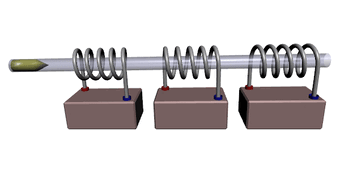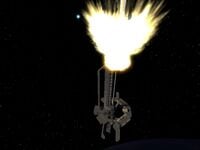Magnetic Accelerator Cannon: Difference between revisions
From Halopedia, the Halo wiki
m (removing double spaces...) |
|||
| Line 2: | Line 2: | ||
[[Image:Coilgun animation.gif|thumb|340px|The Basic Design of a coilgun]] | [[Image:Coilgun animation.gif|thumb|340px|The Basic Design of a coilgun]] | ||
The '''Magnetic Accelerator Cannon''', or '''MAC gun''', is a large [[Wikipedia:Coilgun|coilgun]] that serves as the primary offensive weapon for [[UNSC]] warships. | The '''Magnetic Accelerator Cannon''', or '''MAC gun''', is a large [[Wikipedia:Coilgun|coilgun]] that serves as the primary offensive weapon for [[UNSC]] warships. A larger variant is in service aboard [[Orbital Defense Platform|defensive space stations]]. Within the UNSC arsenal, only nuclear ordnance exceeds the power of the MAC. | ||
The [[M68 Gauss Cannon]] used by UNSC ground forces may be regarded as a relative of the MAC, albeit on a much smaller scale. | The [[M68 Gauss Cannon]] used by UNSC ground forces may be regarded as a relative of the MAC, albeit on a much smaller scale. | ||
| Line 9: | Line 9: | ||
===Mounting=== | ===Mounting=== | ||
The size of a Magnetic Accelerator Cannon is such that it is normally an integral component of a warship's structure. | The size of a Magnetic Accelerator Cannon is such that it is normally an integral component of a warship's structure. Some types of space stations are literally built around the massive weapon. | ||
===Ammunition=== | ===Ammunition=== | ||
A MAC typically fires massive slugs at a fraction of the [[Wikipedia:Speed of Light|speed of light]], or ''c''. | A MAC typically fires massive slugs at a fraction of the [[Wikipedia:Speed of Light|speed of light]], or ''c''. The high muzzle speed gives the slug the kinetic energy and momentum necessary to damage a target and partially mitigates the unguided nature of the slug and its lack of maneuverability. | ||
===Aiming=== | ===Aiming=== | ||
The integration of the MAC to its carrying hull means the entire warship or station must maneuver to aim the weapon. | The integration of the MAC to its carrying hull means the entire warship or station must maneuver to aim the weapon. Even with an [[AI]] laying the gun, the required precision and the 'dumb' nature of the ordnance fired means that hitting an evading target at 100,000 kilometers is extremely unlikely. | ||
==Types== | ==Types== | ||
===Standard Magnetic Accelerator Cannon=== | ===Standard Magnetic Accelerator Cannon=== | ||
The standard ship-mounted MAC fires a 600-ton ferric-tungsten projectile with a depleted uranium core at 30km/s (this is circa 2525 - MAC technology might have improved since). The large amount of energy needed to fire the weapon is particularly onerous on a warship, and the extended recharge time is a significant factor in combat against [[Covenant]] warships as multiple MAC rounds are required to penetrate Covenant shields. | The standard ship-mounted MAC fires a 600-ton ferric-tungsten projectile with a depleted uranium core at 30km/s (this is circa 2525 - MAC technology might have improved since). The large amount of energy needed to fire the weapon is particularly onerous on a warship, and the extended recharge time is a significant factor in combat against [[Covenant]] warships as multiple MAC rounds are required to penetrate Covenant shields. The standard MAC is sufficient to destroy any human vessel or severely damage an unshielded Covenant vessel. | ||
An experimental version of the MAC was developed to fire three successive rounds on a single capacitor charge. | An experimental version of the MAC was developed to fire three successive rounds on a single capacitor charge. A prototype was mounted on the {{UNSCShip|Pillar of Autumn}}. | ||
[[Image:Cairo_Mac_firing.jpg|thumb|Cairo Orbital MAC Station Firing.]] | [[Image:Cairo_Mac_firing.jpg|thumb|Cairo Orbital MAC Station Firing.]] | ||
| Line 27: | Line 27: | ||
==="Super" Magnetic Accelerator Cannon=== | ==="Super" Magnetic Accelerator Cannon=== | ||
:''Main article: [[Orbital Defense Platform]]'' | :''Main article: [[Orbital Defense Platform]]'' | ||
A UNSC defense platform typically mounted a much larger and more powerful version of the standard MAC, nicknamed "Super MAC" or "the Big Stick." | A UNSC defense platform typically mounted a much larger and more powerful version of the standard MAC, nicknamed "Super MAC" or "the Big Stick." These Super MACs fired a 3000-ton ferric-tungsten round at 0.4 ''c''<ref>[[Halo: Fall of Reach]], pg. 283</ref>., powerful enough to penetrate a fully shielded Covenant warship. By receiving power from [[Orbital Defense Generator|ground-based powerplants]], orbital platforms could achieve recharge and reload times as short as five seconds. | ||
==Speculation== | ==Speculation== | ||
===Other MAC Sizes=== | ===Other MAC Sizes=== | ||
Although never explicitly elaborated upon, there may be many more different sizes of MAC based on the sizes of possible mounts. | Although never explicitly elaborated upon, there may be many more different sizes of MAC based on the sizes of possible mounts. For example, one might extrapolate that a [[UNSC Frigate|frigate]] would mount a smaller, less powerful cannon than a [[UNSC Supercarrier|supercarrier]] or a {{ShipClass|Marathon|Cruiser| cruiser}}, if only for power management issues. | ||
Conceivably, a 'large' ship could mount many 'small' MACs. | Conceivably, a 'large' ship could mount many 'small' MACs. However, the lack of such occurrences might suggest that the power of a MAC, once the mass and volume of all attendant components (ex. capacitors) are accounted for, does not scale linearly. | ||
==={{ShipClass|Halcyon|Cruiser|}} MAC Location=== | ==={{ShipClass|Halcyon|Cruiser|}} MAC Location=== | ||
Revision as of 23:01, July 13, 2007
| This article does not meet the wiki's general standards and/or standards on layouts. You can help by cleaning this article. |
The Magnetic Accelerator Cannon, or MAC gun, is a large coilgun that serves as the primary offensive weapon for UNSC warships. A larger variant is in service aboard defensive space stations. Within the UNSC arsenal, only nuclear ordnance exceeds the power of the MAC.
The M68 Gauss Cannon used by UNSC ground forces may be regarded as a relative of the MAC, albeit on a much smaller scale.
Overview
Mounting
The size of a Magnetic Accelerator Cannon is such that it is normally an integral component of a warship's structure. Some types of space stations are literally built around the massive weapon.
Ammunition
A MAC typically fires massive slugs at a fraction of the speed of light, or c. The high muzzle speed gives the slug the kinetic energy and momentum necessary to damage a target and partially mitigates the unguided nature of the slug and its lack of maneuverability.
Aiming
The integration of the MAC to its carrying hull means the entire warship or station must maneuver to aim the weapon. Even with an AI laying the gun, the required precision and the 'dumb' nature of the ordnance fired means that hitting an evading target at 100,000 kilometers is extremely unlikely.
Types
Standard Magnetic Accelerator Cannon
The standard ship-mounted MAC fires a 600-ton ferric-tungsten projectile with a depleted uranium core at 30km/s (this is circa 2525 - MAC technology might have improved since). The large amount of energy needed to fire the weapon is particularly onerous on a warship, and the extended recharge time is a significant factor in combat against Covenant warships as multiple MAC rounds are required to penetrate Covenant shields. The standard MAC is sufficient to destroy any human vessel or severely damage an unshielded Covenant vessel.
An experimental version of the MAC was developed to fire three successive rounds on a single capacitor charge. A prototype was mounted on the UNSC Pillar of Autumn.
"Super" Magnetic Accelerator Cannon
- Main article: Orbital Defense Platform
A UNSC defense platform typically mounted a much larger and more powerful version of the standard MAC, nicknamed "Super MAC" or "the Big Stick." These Super MACs fired a 3000-ton ferric-tungsten round at 0.4 c[1]., powerful enough to penetrate a fully shielded Covenant warship. By receiving power from ground-based powerplants, orbital platforms could achieve recharge and reload times as short as five seconds.
Speculation
Other MAC Sizes
Although never explicitly elaborated upon, there may be many more different sizes of MAC based on the sizes of possible mounts. For example, one might extrapolate that a frigate would mount a smaller, less powerful cannon than a supercarrier or a Template:ShipClass, if only for power management issues.
Conceivably, a 'large' ship could mount many 'small' MACs. However, the lack of such occurrences might suggest that the power of a MAC, once the mass and volume of all attendant components (ex. capacitors) are accounted for, does not scale linearly.
Template:ShipClass MAC Location
Many believe that the MAC launch tube is located near the underside of the ship, where there are three large plates. However, it is more likely that the tube is located along the entire length of the ship. Logically, the multiple powerful magnets needed to accelerate a 600 ton slug to 0.1c requires an exceptionally long tube, allowing for many magnets to affect the projectile. The huge 1.17 km length of the Pillar of Autumn would facilitate this, making the most likely muzzle location of the MAC tube to be located at the protrusion at the ship's bow.
Further supporting the hypothesis of a tube running through the entire ship is the structure and design of Cairo Station. After exiting the cargo elevator, the player can look up and observe the Super MAC platform in action. The slug travels the entire length of the tower, and exits at the "top." Later in the level, the player can notice the loading zone of the slugs at the base of the launch tube.
Sources
- ^ Halo: Fall of Reach, pg. 283

